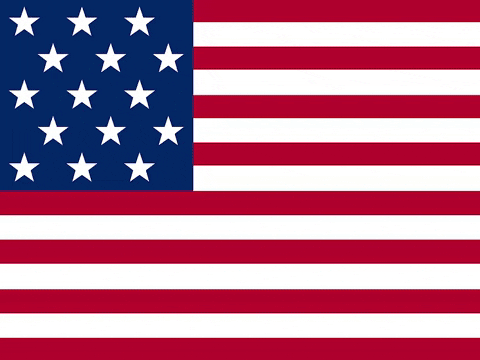
As Black Americans embrace the new federal Holiday, Juneteenth, that was passed quickly within the Senate on Thursday June 17th, 2021, mixed emotions flooded all over America within the Black community. What took them so long to finally do this? And now that we have this Holiday, will Black political requests like reparations and teaching critical race theory in schools also be heard? The United States hasn’t established a federal holiday since Martin Luther King Jr day in 1983, and even that was like fighting tooth and nail to get. Until Juneteenth, there have only been 10 federal holidays for the entire country.
Where Did Juneteenth Come From?
So, let’s back up a bit, the watered down definition of Juneteenth is the celebration of the day that slaves were freed – the end of slavery. President Abraham Lincoln had freed the enslaved two and a half years earlier in his Emancipation Proclamation, but Texas never fell to Union troops in battle, so they had no idea that slavery was done and over with. However, Lincoln didn’t actually free any of the approximately 4 million men, women and children held in slavery in the United States when he signed the formal Emancipation Proclamation. The document only applied to enslaved people in the Confederacy, and not to those in the border states that remained loyal to the Union.
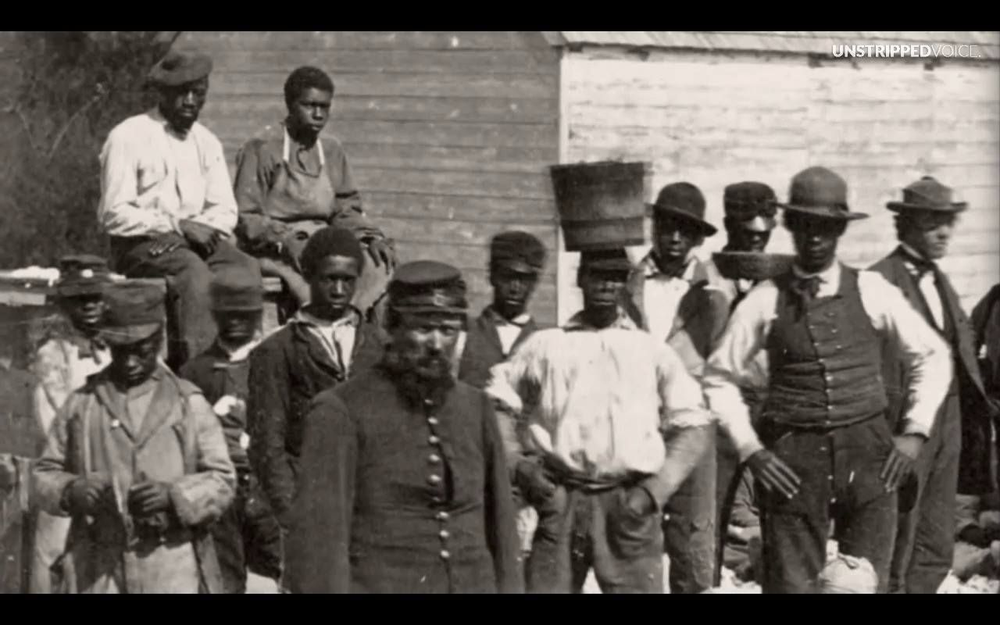
The symbolic power was enormous, as it announced freedom for enslaved people as one of the North’s war aims to preserve the Union. Nations like Britain and France were considering supporting the Confederacy to expand their power and influence but backed out due to their resistance to slavery. Black Americans could serve in the Union Army for the first time, and nearly 200,000 did just that by the end of the war.
All emancipation did was turn the former slaves world upside down. Can you imagine these white people so used to Black people serving them and then all of a sudden there is a law forbidding any kind of slavery anymore? Black people still had the option to stay on their plantations and work for money, but not a lot of them did. I don’t blame them given the cruelty that most slaves endured from these so called “masters” and “owners.” Black people now could demand respect and equality. It is kind of a shame that there had to be a law for just regular human decency, but that is the way America was and still is in so many ways.
Black folks could also own guns to protect themselves and white folks were scared that Black people would soon take revenge. But that’s not at all what Black people wanted to do, they just wanted to be free and live their lives; FREE. But of course, white people just couldn’t accept this. Did you know that most of the 8 million whites did not own slaves and about 1/3 of them were illiterate? These were the whites that scowled at Black people and hated seeing them prosper after freedom. You would even say that they looked at Blacks as competitors because Black people were starting to thrive; buying land, learning languages, teaching their customs and new ways. It’s incredibly unfortunate that these white people didn’t just partner with Black people and all thrive as one, but instead they resorted to heinous acts of violence out of pure jealousy and self hate. This we all know to well as groups like the KKK.
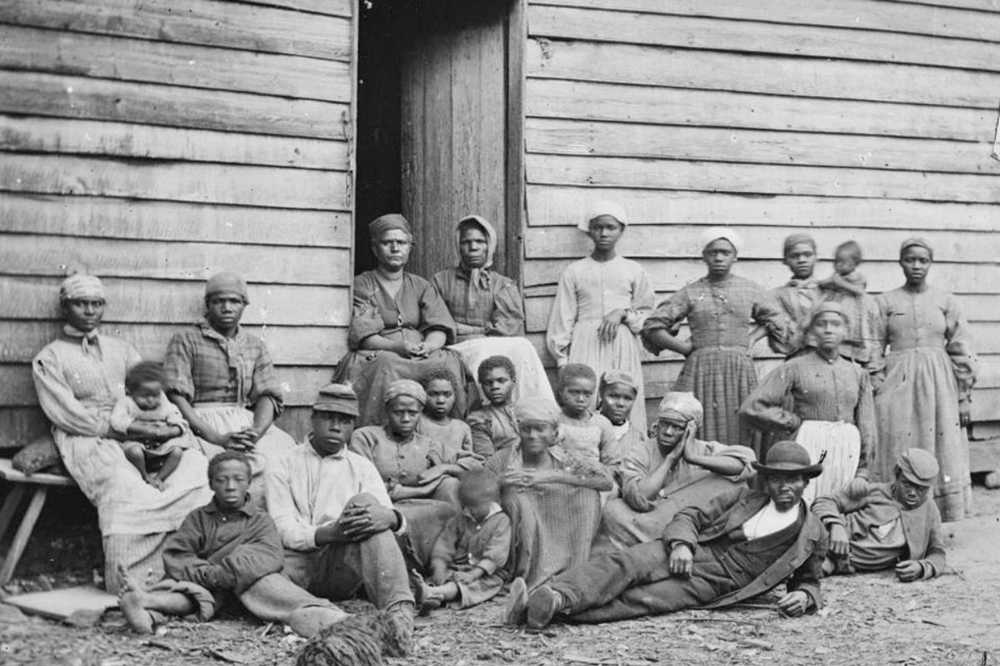
“It is my greatest and most enduring contribution to the history of the war,” Lincoln said of emancipation in February 1865 “It is, in fact, the central act of my administration, and the great event of the 19th century.”
Many of the founders themselves owned enslaved workers, and though they acknowledged that slavery was morally wrong, they effectively pushed the question of how to eradicate it to future generations of Americans. By 1861, when the Civil War broke out, more than 4 million people (nearly all of them of African descent) were enslaved in 15 southern and border states.
When the news broke out that slaves were free, Union soldiers, many of whom were Black, marched onto plantations and across cities in the south reading small copies of the Emancipation Proclamation spreading the news of freedom in Confederate States. Only through the Thirteenth Amendment did emancipation end slavery throughout the United States. Freedom finally came to Texas on June 19, 1865, when some 2,000 Union troops arrived in Galveston Bay announcing that the more than 250,000 enslaved Black people in the state, were free by executive decree.
Second Independence Day
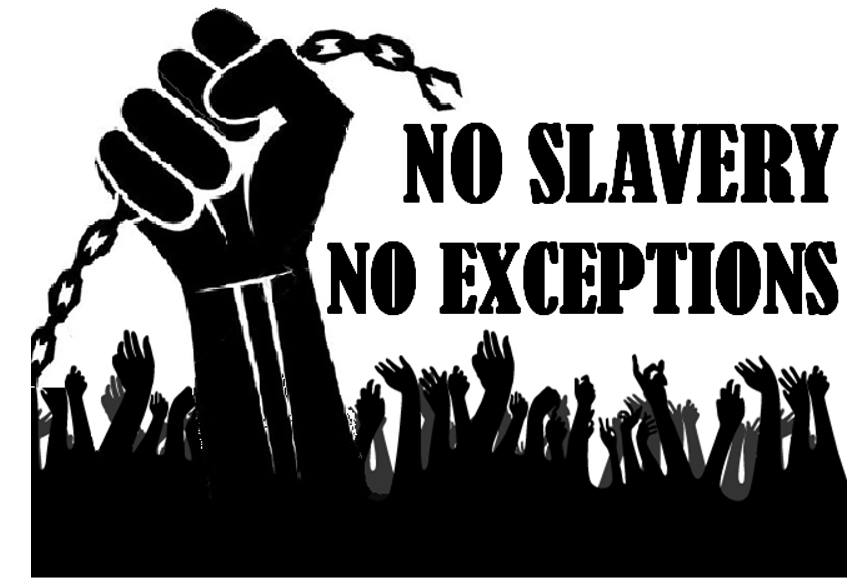
Lincoln was assassinated on April 14, 1865, and the necessary number of states didn’t endorse the 13th Amendment until December 6. Even though Section 1 of the 13th Amendment outlawed chattel slavery and involuntary servitude (except as punishment for a crime), Section 2 gave the U.S. Congress the power “to enforce this article by appropriate legislation.” The year after the amendment’s passage, Congress used this power to pass the nation’s first civil rights bill, the Civil Rights Act of 1866. The law invalidated the so-called black codes, laws put into place by the former Confederate states that governed the behavior of black people, effectively keeping them dependent on their former owners. If the Confederate states wanted to regain representation in the federal government, they were required to ratify the 13th Amendment.
The 13th Amendment was “established” to give equality to Black Americans, but we all know that was only the beginning of the fight for equality well into even today in the 21st century.
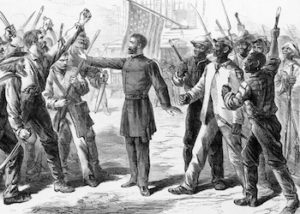
Although it has long been celebrated in African American communities, Juneteenth remains largely unknown to most Americans, until now. While most Black Americans are excited that we have this Holiday and will definitely celebrate it for ourselves and our ancestors, there are so many issues with this Holiday and the hidden agenda behind the American government.
Black Americans have been arguing, fighting, and petitioning for American schools to teach the truth about slavery as well as Black heroes, etc. There just isn’t enough education on Black history for the fear of making America look like the monster it actually was and still is to some degree. Instead, now people are going to social media to get news and information and doing their own research. Black families are taking out books and teaching their kids about what really happened here in America, not just to Black people, but the indigenous as well. The fact that our government made Juneteenth a Federal Holiday without making it priority to teach why we have Juneteenth is completely hypocritical but not surprising.
In September of 2020, President Donald Trump sent out a memo calling on federal agencies to cease funding any staff training activities that focused on white privilege and critical race theory or that suggested the United States or any individual race or ethnicity is “inherently racist or evil.” Such training sessions, according to the memo, amount to “un-American propaganda”. Critical race theory, which examines the ways race and racism intersect with politics, culture, and the law, is currently banned in Arkansas, Idaho, Florida, and Oklahoma.
Critical Race Theory is far from some kind of propaganda, we live here in America and we see and know exactly how racist it is here. Our children need to know how and where it began and how to deal with it. It’s important to study the history of racism in the United States, including the ways in which that history continues to influence our courts, schools, and other institutions. It’s not about pointing at groups of people and calling them evil, but educating and validating the experiences of the people that have been criticized and people who often are ignored by policy makers, judges, educators, and others who hold positions of power in our society. How can you make Juneteenth a Holiday and not talk about this very thing in schools?
Why Most Black Americans aren’t Impressed
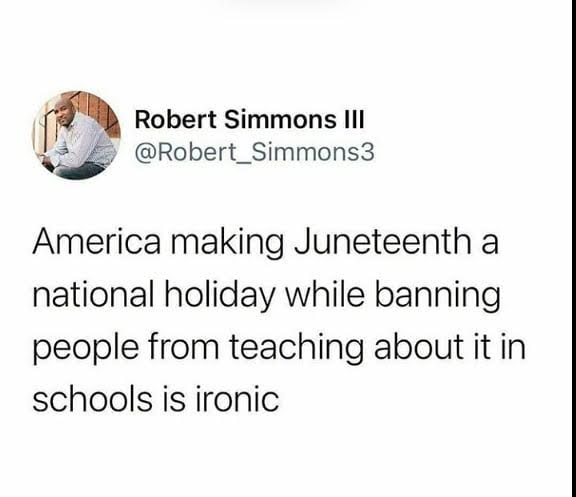
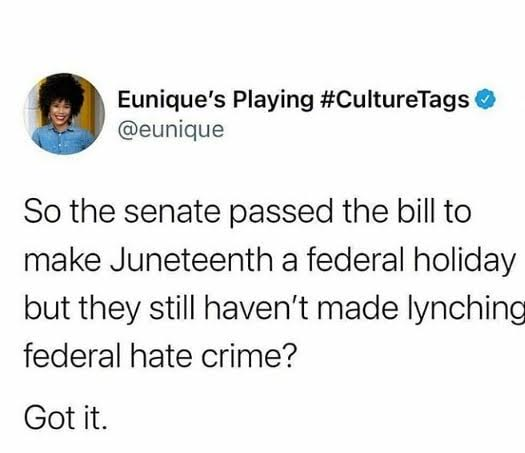
We really did not need America to give us anything and quite frankly I don’t believe we asked for it. What we have been asking for more recently is legislative change, police reform, and equal economic opportunity. It does seem like a slap in our face. How is it you voted so easily on a Holiday that we weren’t out there marching, crying, and yelling for; but no movement on police killings?
Did you know that it cost our government a significant amount of money to make a federal holiday?, According to a 2014 estimate by the White House budget office, it costs $660 million to cover a day of payroll and holiday premium pay. I have a good idea of where that kind of money could go.
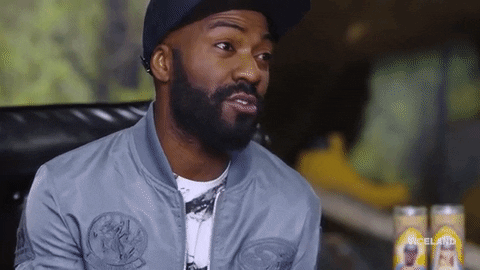
Also, the Senate was able to unanimously pass the Juneteenth holiday bill, but still divided on issues of Black voting rights, especially regarding the John Lewis Voting Rights Advancement Act, a Democratic bill that aims to prevent states from carrying out racially discriminatory voting laws. Why?
Filmmaker Bree Newsome said: “I find this insulting, actually. For the Senate to unanimously pass this bill but refuse to unanimously support Black voting rights is a spit in the face. It’s [an] entirely patronizing, hollow performance. They don’t deserve applause for this.”
Black Americans aren’t saying we won’t accept our Holiday, but America, if you recognize Juneteenth and what it stands for then you must recognize all of the concerns of Black citizens and move just as fast on those issues as you have this one. I think the American government knows exactly what it’s doing; giving us this Holiday isn’t anything of any significance to them. If it was, they would have addressed the real concerns of the Black people. However, I have faith in the Black community and I will continue to celebrate this day for my ancestors, my friends, future family and for myself. Juneteenth doesn’t only represent the end of hundreds of years of slavery, but it’s a symbol of how volatile and steadfast our race is. We have accomplished so much it’s no wonder they are jealous of our strength. They may not have any real significance behind giving us this Holiday, but little do they know every time they show us where we were and where we are now, it motivates us as a culture to keep going.
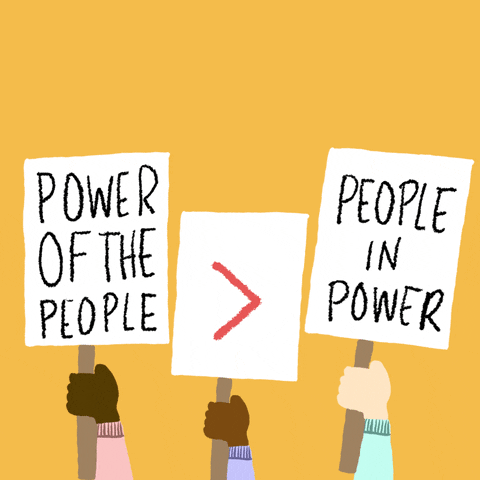
Powered by WPeMatico


